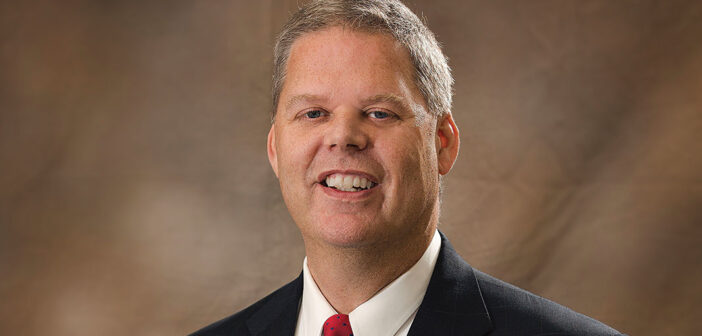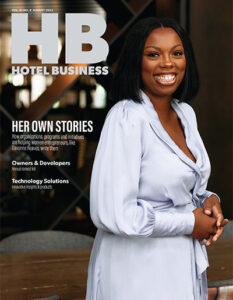Mark Ricketts, chief culture officer, McNeill Hotel Company, has been in the hospitality industry for as long as he can remember. Late last year, he was diagnosed with ALS, or amyotrophic lateral sclerosis, a progressive neurodegenerative disease that affects nerve cells in the brain and spinal cord. Hotel Business spoke with him about his career, the hospitality issues that are important to him and his legacy.
—Gregg Wallis
Why did you originally choose a career in hospitality?
Certainly, to an important extent, I was born into it. Both Philip H. McNeill Jr. [the company’s CEO]and I are second-generation hoteliers. We both had great mentors and colleagues in our fathers. My dad never played favorites in the sense he was always serious with me and expected me to earn my way in this industry.
In fact, early in my career I purposely did not work with my father. Instead, I worked with companies like United Inns, Servico and Wyndham. Like many of my generation, I worked my way up as a bellman, front-desk clerk and buffet chief. I was first appointed as a GM at the age of 23 and won a GM of the Year Award with Servico at a Quality Inn in New Orleans. In all, I was a hotel general manager for about 10 years.
You have a long career in hospitality. What are some of the highlights of your time in the industry?
Of course, it’s the people—the ones who influenced me, the ones I enjoyed working with on a daily basis and the ones who trusted in me to help them guide their careers. I thank all of them.
A couple of highlights or milestones do stand out. In 2004, when I was VP of hotel operations for Master Hospitality Services, we earned the Partnership Circle Award from Marriott International, which was a thrill. I remember going on stage to meet Mr. Marriott.
In 2005, I joined my father at Equity Inns to be VP of asset management. In late 2007, we sold the Equity Inns portfolio of 138 hotels to a real estate fund of Goldman Sachs for $2.2 billion.
I then moved to the Archon Hospitality division of Goldman Sachs to be SVP – hotel asset management until 2015, when I joined Phillip at McNeill Hotel Company, which had just been formed. The story of McNeill is yet to be completely written, but we are extremely proud of what we have accomplished in a short period of time, putting our values and character—not just hospitality experience—to the test.
What would you say is your management style when it comes to the people you employ?
My core belief is that I live to serve others, and “People Serving People” is my mantra. Phillip and I both believe that from the corporate standpoint, our job is to serve our people. If we go about it in the right way, they, in turn, will do a fantastic, genuine job in serving our guests. We want the appreciation of serving guests to come through at the property level every day, and we encourage interaction with the local community, its people and organizations.
If anything else, I believe in communicating a lot to our people. All through the pandemic, we held regular meetings with staff through video conferencing, sharing successes and bolstering spirits. Our people receive a daily stream of positive messages from me.
Yes, I am a bit of a cheerleader, but I’d like to think I’m an honest one. McNeill folks know I am a fan of legendary football coach Lou Holtz. One of his great quotes is, “The price of leadership is responsibility and part of that responsibility is to stay positive whether you feel like it or not.” All of us who were in leadership positions during the pandemic understand exactly what he meant. Holtz also said that if you improve the life of others, then your life is significant. We encourage our people to make a difference in the lives of others, and I’d like to think we give them the encouragement, training and authority to do so.
You have been a champion for diversity and inclusion. Why is that important to you? Where does the industry stand in that area?
It’s really simple. Even during these challenging times, we remain a nation of great promise. What is different and unique about each of us should be a source of greater strength and productivity, not division. We need more voices on the table; we need to understand the viewpoints and experiences of others.
The murder of George Floyd was a wakeup call for many of us and the impetus to forming our Diversity and Inclusivity Council in June 2020. The council has independent leadership, a budget provided by McNeill corporate, access to its own consultant and a regular schedule of meetings and activities. Last year, prior to it becoming a federal holiday, and based on the input of team members, we made Juneteenth a corporate holiday.
Because I am a white male, I don’t know the things that go on, for example, with people of color or Asian-Americans. Since we started this program, 10 people have written to me individually, sharing their experiences and deep feelings, which is both humbling and gratifying.
Your company implemented a new structure for the supervision of its property-level operations in March. How has that transition gone?
It’s going very well. Post-COVID, we moved from a model where our area general managers were also on-site general managers of properties. This became problematic as hotels got busier coming out of COVID.
Now, our three regional directors of operations have oversight over, on average, nine properties. They will be able to work closely with their assigned hotels on nuts-and-bolts areas like accounting, inventory management or sales strategies, and help with training initiatives and counseling team members. We expect that the RDOs will be able to make on-site visits three times a year to each of their properties.
We promoted two individuals and brought in one new person for these three initial positions, which I think is a good mix. Most importantly, this arrangement is scalable as we continue to grow.
How has your company dealt with the labor crunch?
I think there are two key aspects to our response. The first was investing in and expanding the skill sets of our own people so they are more productive and more satisfied in working with McNeill. We took “advantage” of the pandemic to expand our sales training with Doug Kennedy’s group, and we introduced management-in-training programs. We want people to understand that their efforts are appreciated and there is room for career growth with McNeill.
The second is being flexible. In some cases, this meant using contract labor to staff properties. The challenge there is in not disturbing the organizational culture. In other cases, we have adopted sliding hourly scales to keep hotels fully staffed at key times, like a football weekend at one of our properties in SEC territory. Also, we have to get away from traditional eight-hour shifts to better accommodate our team members’ needs and preferences.
What do you hope to be your legacy?
Like many of us, to be thought of as someone who was kind to others and made a positive difference in their lives. I sincerely believe in People Serving People and the culture of our organization.
As you know, I was diagnosed with ALS late last year. I am doing well now, but it is only natural for me to think a bit more about how I have conducted my life and the people that surrounded me. I have a wonderful wife and children and feel extremely blessed. I have great colleagues at McNeill. I am also proud that McNeill has chosen to establish an MHC Cares Humanitarian Award in my honor.


